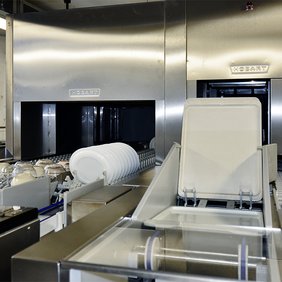Nearly 4,000 place settings per hour, 50 % reduction in energy and water consumption
With the contribution of the Ministry of Science, Research and Arts of the German federal state of Baden-Württemberg, covering no less than 70 percent of the investment costs of 2.3 million euros, a partially and a fully automated machine with a cleaning capacity of almost 4,000 place settings per hour were installed between May 2015 and January 2016. This replaced the entire warewashing equipment and organic waste treatment system after more than 25 years of service in the cafeteria run by the student services "Studierendenwerk Stuttgart" in Vaihingen.
The cafeteria's warewash systems on the Vaihingen campus uses a full 180 square metres of space. No wonder, since it consists of a semi- and a fully-automatic system capable of washing almost 4,000 place setting per hour as well as an automatic organic waste treatment system. Both warewash systems have a total weight of seven tons without water and will be doing their job for the next 10 to 15 years. The fully-automatic system is fed with plates, cutlery and trays automatically, with the only exception of delicate glassware. The semi-automatic system can only pick up trays and cutlery automatically; the rest has to be inserted manually. The advantage here is that various plate sizes and bowls can be used for food such as pasta, salads and the like.
Each of the machines is composed of two warewash systems. The first is used to clean trays and cutlery, the other one to clean dishes. Edgar Fuchs GmbH is the company who specially designed the machines for the cafeteria. The unusual situation of the cafeteria's building and the size of the individual parts required handling and installing the machines with the help of a crane. 2.3 million euros were invested with the Baden-Württemberg Ministry of Science, Research and Arts providing 70 percent of the total cost through grants. This investment in new technology is also an investment in the protection of our environment. The new systems manufactured by Hobart reduce electricity and water consumption by around 50 percent. Each system uses 360 millilitres of water to wash a tray with dishes. "By this forward-looking systems we also live up to our commitments in terms of a sustainable and climate-friendly energy management." says Tobias M. Burchard, managing director of the student services.
The way of the dishes
The first components of the new systems can already be found inside the cafeteria: where students place their trays with dishes and cutlery onto one of the two conveyor belts. The trays take their journey through jacketed tubes, traversing three fire-protected areas, into the scullery and there into the warewash systems. The fully-automatic system is programmed to handle standard plate sizes, whereas the semi-automatic machine is also suitable for plates of different sizes and glassware. After travelling through the various wash sections of the fully-automatic dishwasher, the plates, cutlery and trays are carefully released into dispensers provided for this purpose. Only the small bowls have to be taken out manually. As opposed to the semi-automatic machine where everything has to be removed by hand. Rotating spray nozzles clean both machines and their wash arms fully automatically.
From organic waste to biogas
The cafeteria of the Vaihingen campus, which is the largest run by the Studierendenwerk Stuttgart, produces up to 800 litres of organic waste per day. Owing to the new system, this waste can now be used to produce biogas. A water jet in the fully-automatic machine rinses off the food residue immediately, which is then fed to a screw and introduced into a tank with a capacity of 10,000 litres. The major part of the water drips off on the screw so that the food waste contains as little humidity as possible when arriving in the tank. As far as the semi-automatic dishwasher is concerned, this job is done by cafeteria staff with the residues being dumped into two pipes provided for this purpose. A vacuum produced in these pipes at the push of a button, transports the waste to the tank. Every other week, its contents is drained, without producing any odour, into a tank lorry and driven to a local biogas plant. Thus, the time-consuming and unpleasant operations involved in handling organic waste containers are dispensed with. 1,400 cubic metres of biogas can be produced from one filling.
About Studierendenwerk Stuttgart
The student services Studierendenwerk Stuttgart provide the social infrastructure for more than 60,000 students of 14 polytechnics and universities in Stuttgart, Ludwigsburg, Esslingen, and Goeppingen. Apart from accommodation, cafeterias, day nurseries and the processing of student loan applications, the Studierendenwerk Stuttgart offers comprehensive advisory services. Among which legal, social, and psychological assistance. The Studierendenwerk Stuttgart has a public and a social mission laid down in the student services law of the federal state of Baden-Württemberg. It sees itself as a university service provider with a long tradition: founded in 1921 as the "Stuttgarter Studentenhilfe e.V.", it has, over 90 years, developed from a needy students' aid society into a modern service provider. Today, more than 400 employees work to make life easier for students during their studies and to support and look after them in social and economic terms. Tobias M. Burchard is the managing director of the Studierendenwerk Stuttgart.
Source: Press release of the Studierendenwerk Stuttgart, Simone Hübener

